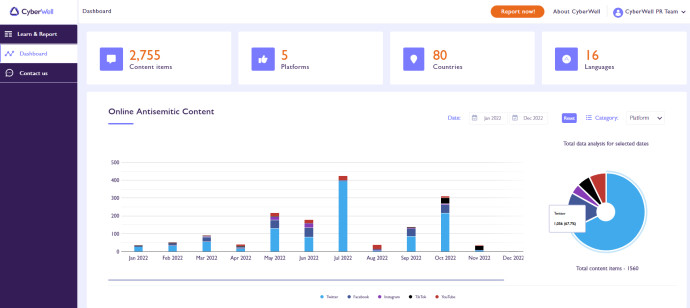“More data, less hate.” It’s a simple slogan for a complex task, yet Tal-Or Cohen Montemayor, head of CyberWell, is convinced that the technology her company has pioneered to monitor and report antisemitism on social media can help improve the enforcement of community standards and reduce the amount of online antisemitism that currently pervades social networks.
Originally from Rockville, MD, Cohen Montemayor made aliyah in 2009 after finishing high school, joined the IDF as a lone soldier, and after completing her military service, majored in law and political science at Reichman University.
After working in the legal field for several years, she pivoted into open-source and business intelligence, leading research projects on extremist movements in the United States that dealt with online antisemitism. “What shocked me the most in that process,” she explains, “was that the same hateful content that I was seeing in the dark corners of the Internet, I increasingly saw again and again in our mainstream everyday platforms,” referring to major social media outlets such as Facebook, Twitter and TikTok.
While one might expect to find antisemitic content on a neo-Nazi website such as the Daily Stormer, she adds, she was surprised to find similar rhetoric on mainstream social media platforms, which hundreds of millions of people access daily to communicate with friends and family.

“I thought there had to be a better technological response rooted in the most advanced technology in data to fight back against this phenomenon,” she says. Fortified by the encouragement of managers and colleagues, Cohen Montemayor founded CyberWell in January 2022 as an Israeli not-for-profit organization, and the organization began actively monitoring social media platforms in May. The organization’s name, she explains, is derived from the concept of using open-source intelligence and improving the cyberspace used by people to bring “wellness” to that space.
“CyberWell is actually the first open live database of antisemitic content,” says Cohen Montemayor, “and provides a wealth of information so that people can see the state of online antisemitism for their own eyes, both by interacting with the content and by using our visualization tools.”

While various Jewish organizations have presented reports on antisemitism, these are usually issued once or twice a year, with no sharing of data. By contrast, CyberWell is constantly updated and offers access to anyone. “We should be democratizing this data,” says Cohen Montemayor emphatically. “Everybody should have access to this data because it’s the fastest growing form of online antisemitism. The only way we will get a united response to the issue is if everyone has access to the data.”
Another vital reason for constantly monitoring and updating information, she points out, is that monitoring online antisemitism regularly puts consistent pressure on social media platforms to drive accountability.
Cohen Montemayor explains that the controversy caused by the recent antisemitic tweets by singer and songwriter Kanye West and basketball star Kyrie Irving highlight the importance of social media accountability. West, who now goes by the name “Ye,” posted antisemitic comments on his social media accounts this past November, praising Adolf Hitler and blaming the “Jewish media” and “Jewish Zionists” for various misdeeds. Irving, who plays for the Brooklyn Nets, had posted a link on Twitter to an antisemitic film, “Hebrews to Negroes,” which claims that the Jews control the world, and that Jews were responsible for slavery.
If social media platforms were applying the best technology to enforce social media policies against antisemitism, these entire episodes would not have happened. The antisemitic content was posted to the two celebrity accounts of Irving and West, which have a combined following of more than 77 million people.
As a result, she explains, the social media users responded by echoing the same antisemitic tropes that the celebrity accounts brought into the mainstream. “There was a 24,000% increase in antisemitic content using Kanye’s name that came through CyberWell’s monitoring technology,” says Cohen Montemayor, “which really reflects what happened in that specific case.”
CyberWell created tailored alerts for each social media platform, showing them how antisemitism online spiked on each platform in reaction to the comments made by West and Irving, and showed which images were repeating and spreading antisemitic tropes on each platform. None of the major social media companies, she says, with the exception of Meta (the parent company of Facebook), bothered to acknowledge the letter from CyberWell.
Since CyberWell began operations in May, it has reviewed over 6,000 pieces of antisemitic content, but its technology has indicated that there are over 110,000 pieces of antisemitic content that are easily online and available on these platforms. Because the organization has been monitoring content consistently, it was able to provide an in-depth response to the uptick in online antisemitism related to Kanye West and Kyrie Irving.
Cohen Montemayor then provides a brief, non-technical explanation of how the CyberWell database works. “CyberWell’s mission is to drive the enforcement and improvement of community standards across the digital space,” she explains, “and we share the data that we collect with everyone because we want to empower the fight against antisemitism. We apply technology and open-source intelligence to monitor social media platforms for antisemitism. We then vet that material and classify it according to two prongs, which are very connected to our mission statement. First, we look at the policy that this content is violating, because our goal is to increase enforcement. Second, we classify all of that antisemitic content according to one of the eleven examples of the IHRA working definition of antisemitism.”
The IHRA definition of antisemitism includes various types of antisemitism, including justifying the killing of Jews in the name of radical ideology, Holocaust denial and denying the Jewish right to self-determination in the State of Israel. The IHRA definition of antisemitism has been officially adopted by the United States and 37 other national governments, as well as numerous local governments, universities, law enforcement agencies, civil society organizations, and international bodies worldwide, including the UN and EU. “The IHRA working definition,” she adds, “is a cornerstone of how we believe that social media platforms can improve the way that they treat antisemitic content online and action that content.” Finally, the material is reviewed by two expert analysts and is then reported to the various social media platforms.
In line with the organization’s democratization of the process, the database can be viewed by anyone at the following link – app.cyberwell.org. Cohen Montemayor notes that viewers can use the site as a reporting platform to report antisemitic content. “Instead of having that a once-a-year report, this database gives people the opportunity to interact with that raw data content, which is very important to us right now.”
How does online antisemitism affect Jews? Cohen Montemayor notes that students have reported that online antisemitism is one of the major forms of Jew-hatred that affects their day-to-day life, causing depression and anxiety. “I think this generation is very open to digital activism, and they’re looking for a way to fight back against the Jew-hatred that’s plaguing their digital experience.” The CyberWell database gives them the opportunity to respond.
She adds that while many people downplay the severity of online antisemitism, viewing the actual content on the CyberWell database can give them an accurate, though at times unpleasant understanding of what is being said about Jews online. Cohen Montemayor says that high school teachers educating students about the issue of Holocaust denial can see numerous examples of such statements online for their use in the classroom.
Ultimately, she states, the enforcement rate of social media networks against antisemitic posts is only between 20% and 25%. Cohen Montemayor criticizes the enforcement model of the platforms themselves, explaining that rather than being proactive, they rely on their users to report content violations, and, only then, act on a very small percentage of posts.
CyberWell analyzes antisemitic comments according to the digital policy of the platforms themselves. “That’s a very critical issue,” she explains, “because we want to speak their language in order to drive this issue home.”
The Jewish community is a clear minority on social media, says Cohen Montemayor, and social media is a numbers game. That being the case, the only way the Jewish minority can affect the system is by creating transparency and leveraging data through systems such as CyberWell, to make the problem evident and apparent to all.
“Online antisemitism is the highest it has ever been,” she cautions. “The highest levels of antisemitism existed in popular culture before the Holocaust, and before the Nazis came to power – in the media, the salons and the intelligentsia. People need to understand that the reach and the popularity and the platform that these social media companies have given to antisemitism means that the popularity or the exposure that antisemitic ideas have today is higher than what it was during the Holocaust. That’s not to say that the United States is in any kind of danger of a Holocaust happening in the immediate future, but we must understand that it means that antisemitism is now becoming popular opinion in certain circles, and increasingly more mainstream.”
What can be done to stop the proliferation of online antisemitism on social media? Optimally, says Cohen Montemayor, social media platforms need to rely on the IHRA definition of antisemitism to improve their community standards. More immediately, she suggests, they should focus on enforcement, and raise the enforcement level and remove antisemitic content. “It’s very simple,” she says. “The way that we would know if the platforms were doing a better job is if we would see a quantifiable decrease in the amount of online antisemitism through CyberWell’s regular monitoring of social media. This is the beauty of the system we have created. It’s scalable and quantifiable.”
Cohen Montemayor invites users to go to CyberWell’s reporting site at app.cyberwell.org to see the current reports and report incidents of antisemitic content online. “We want to encourage people to hold social media platforms accountable.” She adds that CyberWell will be releasing an annual report this month and will be launching a deeper professional database this year to make its data more accessible to researchers, civil society, lawmakers and law enforcement. “I firmly believe that the way to beat back a technological issue is with technology itself,” she says. “That’s why I’m so passionate about what we’re doing at CyberWell. We are open for collaboration with anybody who shares a vision for ethical technology and a better digital future for us all.”
This article was written in cooperation with CyberWell.
